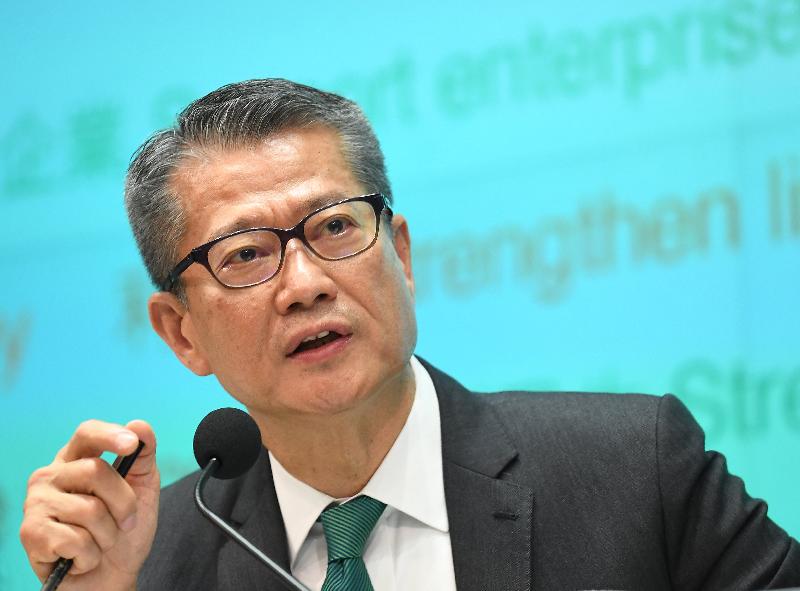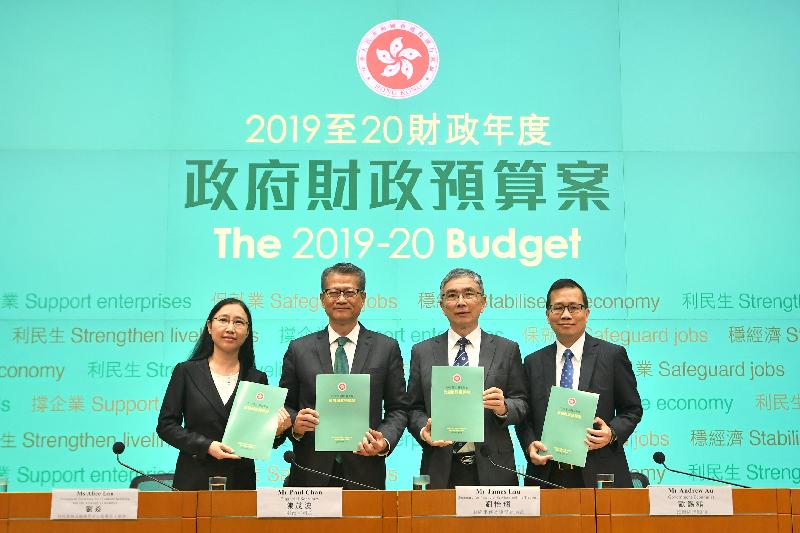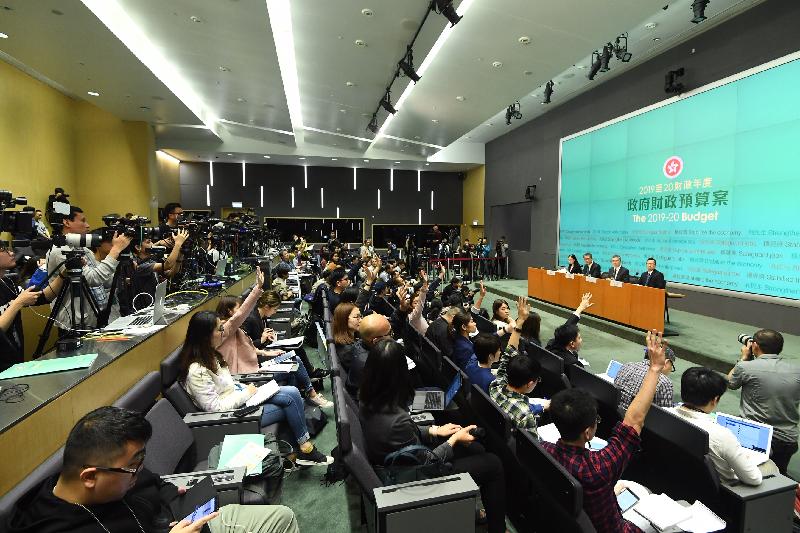Transcript of remarks by FS at Budget press conference (with photos/video)
Following is the transcript of remarks by the Financial Secretary, Mr Paul Chan; the Secretary for Financial Services and the Treasury, Mr James Lau; Permanent Secretary for Financial Services and the Treasury (Treasury), Ms Alice Lau; and the Government Economist, Mr Andrew Au, at the Budget press conference at Central Government Offices, Tamar, yesterday (February 27):
Reporter: Mr Chan, considering climate change is the most urgent issue facing the world, aren’t your environmental measures somewhat anaemic, just more electric cars and green government buildings when we have toxic air, polluted beaches? Secondly, the elephant in the room with the Greater Bay Area plan, how exactly will Hong Kong’s free and open legal system integrate with the Mainland’s – one side will surely have to compromise and change?
Financial Secretary: Thank you for the good question. In terms of our commitment under the climate change, we will never compromise our position. The Environment Bureau has published their blueprint in this respect before – we are working towards this. Environmental protection is very dear to our heart, so in terms of government policy in the past, we did have used resources, say for example for commercial vehicles – diesel commercial vehicles – to be changed.We also introduced incentives to change some of the taxis – these are earlier examples. Going forward, if there are suitable initiatives we will spare no effort in promoting them.
Reporter: Greater Bay…
Financial Secretary: In this area, I mean the environmental protection area, there are areas of co-operation, but certainly that does not and will not be taken as a compromise from Hong Kong’s standpoint in terms of our environmental efforts and commitments.
Reporter: But the political differences between the Greater Bay Area and Hong Kong, how will it be compatible?
Financial Secretary: The Greater Bay Area is a very unique bay area, in terms of this area have three customs areas and under “one country, two systems”. One of the key objectives is to have the factors of production to be freely flowed within this area, but under the current arrangement and the customs restriction there are some policy innovations to be explored. But in terms of our own independent judiciary, rule of law, this is so dear to our heart and this is the foundation for the success of Hong Kong, which we will never compromise.
Reporter: We notice that the fiscal surplus has decreased a lot this year, and the land revenue also dropped quite a lot. But as many sites will be kept for building public housing, is it possible that it would be unlikely for the Government to have more sites for sale in the coming years? And under these circumstances, how will the Government make up for the reduction in revenue, and what would be the new sources of revenue that you will consider? And is it a healthy trend to keep spending so much while our surplus is declining?
Financial Secretary: Thank you for the good question. In terms of land revenue, in the year 2018-19 the projected outturn is about $115 billion, which is slightly less than what we have originally budgeted for. But it is only a very small margin, mainly because of the two unsuccessful tenders in the past year. Going forward, what you have pointed out is quite correct, in the sense that after changing the split between public and private housing land supply the number of sites and the amount of private residential housing supply will decrease, and consequently may have an impact on our land revenue. But this has to be looked at very carefully in terms of – apart from residential sites, do we have commercial sites for sale? In the coming years, we have quite a substantial amount of commercial sites to be put to the market, say, for example the site on top of the West Kowloon high-speed railway station is a very valuable site and the expected sales proceeds would be very high, and also for this year there are also commercial sites in Kai Tak.
Apart from quantity, what is also relevant is the location of the sites and the expected market response and the expected price that these sites could fetch. In the coming year a lot of the sites are in prime locations, say for example in Kai Tak, so that's why when we plan for the land revenue for 2019-20, we are still putting in a comparatively high figure. As to the rest of the five-year period, we have taken experience from our past history, meaning that we take the land revenue as a percentage of GDP in the past 10 years average as the yardstick for us to project the rest of the midrange period. We will keep this under close review, but in the meantime I think this is a very practical approach taking into consideration the actual sites and actual situation.
Reporter: What are other sources of government revenue…?
Financial Secretary: In terms of profits tax income and salaries tax income, the drop next year compared to this year is in fact due to the one-off relief measures. If you look at profits tax and salaries tax, it has been growing in the past few years. At the moment, given our substantial amount of fiscal reserve, we do not think there is a very urgent immediate need for us to look for new income sources, although the Tax Policy Unit should bear this in mind and take this as one of the agenda for their work.
Reporter: One lawmaker earlier highlighted that, despite you announcing that there are a number of increases – one-off increases – to social security allowances, they noted that the Government recently just raised the age limit for elderly social security payments and you announced this employment supplement subsidy, this new subsidy, and there’s no increase in the subsidy. So, would you consider raising that as well for the year? And the second question is on the lower caps for the salaries tax and relevant sweeteners – you explained that it’s because of the uncertainties Hong Kong economy is facing and also much lower budget surplus that we’re seeing in this financial year. So, should the public be expecting fewer and fewer sweeteners, or a smaller amount of sweeteners going forward? And my third question is on the loan-to-value ratio – you mentioned in your Budget that you don’t think, it’s not the right time for the Government to relax any of your cooling measures on the property market. But earlier you indicated that you have heard people’s voices on relaxing these mortgage requirements on loan-to-value ratio, so does that mean that this is not coming anytime soon at all? Thank you.
Financial Secretary: Thank you. The first question that you asked, we did consult the Labour and Welfare Bureau, and it remains their position that this should not be changed at this stage because they are undertaking a review. In the coming two days the Secretary for Labour and Welfare will be hosting a budget briefing press conference. I think he will be in a position to give you more details. As to your question about whether in the future sweeteners will be getting smaller and smaller, that really depends on also our financial position at that time. Depending on the economic situation, the forecast surplus of the Government in the coming years seems to be not as big as before, and being a completely open and small economy we are certainly influenced by external factors. So, on this front, I do not want to speculate, but on the other hand let’s work hard to build our economy – that is the basis for everything. Finally, on the property market, yes we do not intend to relax any of the demand-management measures, and last month I think the CE and subsequently myself also stated that in terms of mortgage percentage this would not be relaxed as well, because we do not want to be misperceived as to, at this stage, doing anything to try to influence the market. On salaries tax, let me ask my colleagues to supplement.
Permanent Secretary for Financial Services and the Treasury (Treasury): Thank you. On salaries tax, I just want to remind us all that it was just last year that the Financial Secretary actually introduced quite a number of changes to the overall salaries tax regime. So, it's not just about the one-off – what we call sweeteners or concessions, but the Financial Secretary does bear in mind especially the tax burden for the middle and lower income classes. Last year, in so far as salaries tax regime is concerned, we broadened the tax band, so each band has been increased from $45,000 to $50,000. We added a new tax band, an additional tax band, and we lowered the marginal tax rate. We also enhanced quite a number of tax deductible items, including allowance with children, allowance for dependent parents, and also introduced a new allowance for disabled dependents. So, these measures collectively will actually have a long-term, recurrent impact on relieving the tax burden of taxpayers, especially for the lower and middle class taxpayers. Thank you.


